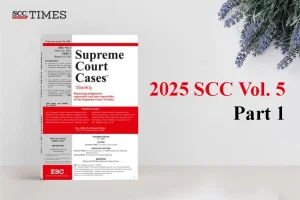In the latest edition of the 2025 SCC Vol. 5 Part 1, legal practitioners and members of the Bench can delve into recent Supreme Court cases on the Criminal Procedure Code, 1973, and the National Investigation Agency Act, 2008, and more.
Constitution of India — Art. 142 and Arts. 32 and 136: Supreme Court has power under Art. 142 to convert a writ petition under Art. 32 to special leave petition under Art. 136, [Ramji Lal Bairwa v. State of Rajasthan, (2025) 5 SCC 117]
Constitution of India — Arts. 21, 14, 50, 32 and 142 — Government action of demolition of buildings/structures, residential or commercial, of persons accused or convicted of criminal offences, where only occupant is such accused/convicted person, or where there are also co-occupants not involved in crime: Action without following due process of law, on ground of building/structure being unauthorised, amounts to punishment. Directions issued by Supreme Court in exercise of power under Art. 142, laying down guidelines to Government for manner of proceeding in such matters, [Directions in the Matter of Demolition of Structures, In re, (2025) 5 SCC 1]
Constitution of India — Arts. 30, 29, 25 to 28, 14 to 16, 19, 21 and 21-A and Preamble — Minority religious educational institution: Constitutional validity of U.P. Board of Madarsa Education Act, 2004, upheld. Provisions regulating higher education degrees are unconstitutional as they conflict with S. 22, UGC Act, [Anjum Kadari v. Union of India, (2025) 5 SCC 53]
Criminal Procedure Code, 1973 — S. 437(6): Bail to accused under S. 437(6), when trial does not conclude within a period of sixty days is not mandatory, [Subhelal v. State of Chhattisgarh, (2025) 5 SCC 140]
Criminal Procedure Code, 1973 — Ss. 482 and 156 — Investigation by CBI — When permissible — Reiterated: Direction for investigation by CBI, held, not permissible in a routine manner or just because some allegations made against the local police. Courts, held, should direct for CBI investigation only in exceptional cases and only when such an order may be necessary for doing complete justice and enforcing the fundamental rights, [Vinay Aggarwal v. State of Haryana, (2025) 5 SCC 149]
National Investigation Agency Act, 2008 — Ss. 3(2), 6(5) and 8 r/w Schedule — Transfer of investigation to NIA: Law clarified on scope of jurisdiction of NIA to investigate scheduled offences. Transfer of investigation to NIA, permissible in offences under NDPS Act and UAPA, [Ankush Vipan Kapoor v. NIA, (2025) 5 SCC 155]

